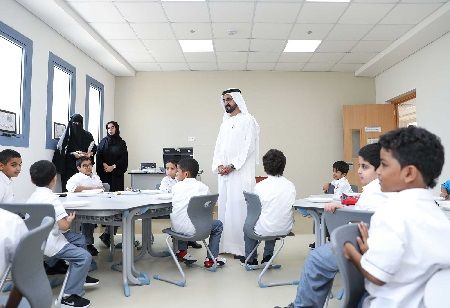-
- KHDA unveils new strategy to make Dubai school fees more affordable for families.
- Policy includes incentives for socially responsible investors and government-backed support.
- Integrated approach links land allocation, staff housing, and urban planning to reduce education costs.
Seeking to tackle worries of the increasing expense of education in Dubai, the Knowledge and Human Development Authority (KHDA) has revealed a new strategy. The education agency aims to launch new incentive plans for socially responsible investors and government-backed guarantees to render quality schooling more affordable for families.
The historic initiative was announced by Aisha Abdulla Miran, Director General of KHDA, at the Mohammed bin Rashid Leadership Forum 2025 at Dubai World Trade Centre, where she spoke about the rising fears of education affordability that have been trending on social media and among parents across the emirate. Talking frankly of the difficulties experienced by families, Aisha Miran recognized the pervasive fears of the cost of education in Dubai that have emerged as a common theme in popular debate.
"Education is not discussed without discussing the exorbitant price of schools, we just saw on social media, and people messaged me, including a foreigner who told me that the education of her children costs Dh1 million in Dubai. On that basis, in the education policy, we kept our emphasis on offering quality education at affordable rates", said Aisha Miran.
The KHDA director outlined an ambitious multi-pronged approach designed to create more educational options for parents while maintaining Dubai’s reputation for academic excellence. Central to the new strategy is a groundbreaking policy that will be presented to the Executive Council, designed to attract a different type of educational investor to Dubai’s market.
"We wish to provide parents with alternative education opportunities, we are developing a policy that will be brought before the Executive Council, the concept of which is to encourage incentives for a particular type of investors whose primary intention is not profitability but other social aims", She clarified.
The framework suggests governmental assistance in the form of subsidised rental of land and fair prices for land to establish a kind of governmental support for socially-responsible education enterprises. The approach goes beyond mere cost-cutting, with urban planning included to form sustainable education environments across Dubai.
Also Read: CityUHK Expands Global Ties with Leading Vietnamese Universities and Enterprises
"Connecting urban planning with land allocation and with it the needs in terms of school infrastructure, and investment expenditure within the sector and running expenditures and educational personnel by making housing available at affordable prices - this is one thing we are focusing on", She elaborated.
This integrated approach acknowledges that various issues like staff housing, running expenses, and infrastructural needs affect education expenditure. While responding to issues regarding affordability, Aisha Miran also discussed Dubai's academic accomplishments and visions in the international arena. "There were strides in education in leading the world, but we are not yet at the aspirations elsewhere. There are years of ours pending to reach top ten positions in them", she conceded.
The KHDA is engaged jointly with multiple stakeholders to make Dubai more desirable for international students, with the target of securing 50 per cent of regional international students. The holistic strategy involves partnerships with multiple stakeholders to form an integrated learning environment to favor affordability as well as quality.
We cooperate with certain institutions in the sense of offering housing at affordable prices and medical insurance because it has an impact on competitiveness for obtaining international students, particularly because our target is to win 50 per cent of them, as well as drawing educational programs and universities from around the world and that will contribute to the value addition to the emirate," She elaborated.
The success of these initiatives will depend on coordinated efforts across government entities, reflecting Dubai’s integrated approach to addressing complex social and economic challenges. “There are plans that need solidarity and integration from different entities”, she added. The new policies are expected to be implemented in phases, with the Executive Council review marking the first step in a comprehensive reform of Dubai’s educational landscape that balances excellence with affordability.
🍪 Do you like Cookies?
We use cookies to ensure you get the best experience on our website. Read more...

